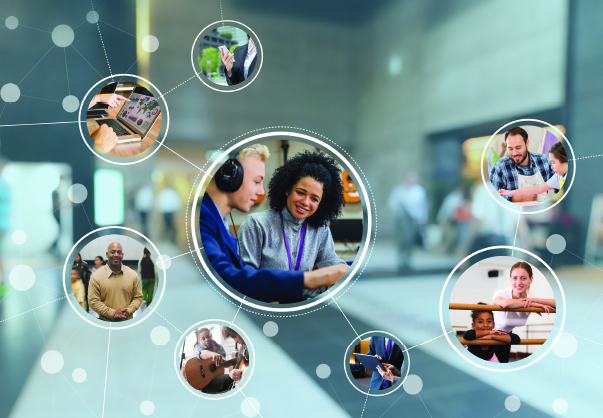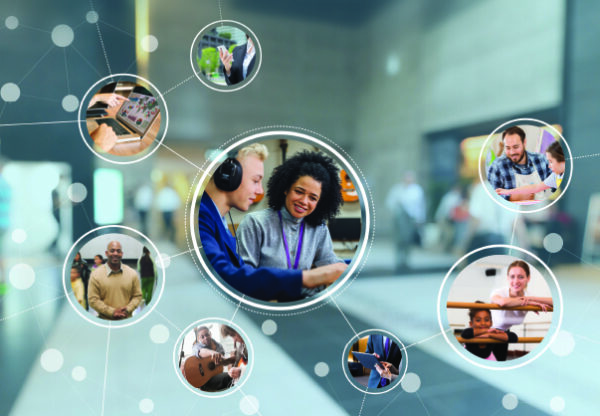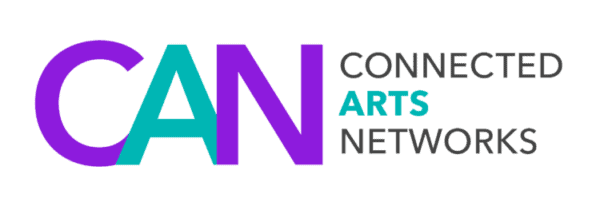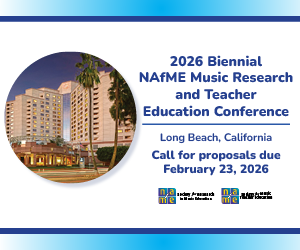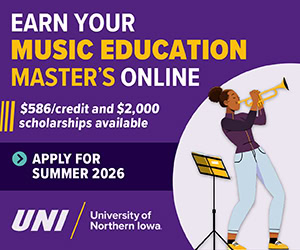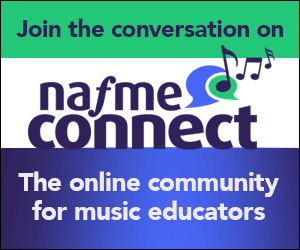/ News Posts / Strengthening Music Education Through Music-Focused PLCs
From Theory to Practice
Strengthening Music Education Through Music-Focused PLCs
By LaSaundra Belcher and Angela Schendel Keedy
This article first appeared in the April 2025 issue of Teaching Music.
Lessons learned from experience with the Connected Arts Networks initiative provide best-practice strategies for teachers forming their own professional learning communities.
Applications are open now for fall 2025 Connected Arts Networks teacher participants—deadline July 28.
What do Piaget, Vygotsky, Bruner, Ladson-Billings, and Gardner have in common? How about Kodály, Orff, Gordon, Suzuki, Madsen, and Duke? They are educational theorists and music education philosophers whose approaches we may recognize and draw from. Music educators devote a tremendous amount of time honing our craft through extensive study of how students learn and identifying the best approaches to meet their needs.
K–12 schools in the United States frequently provide professional development (PD) to their teachers as part of the regular school contract in order to continue to grow as education professionals. This professional development, however, is infrequently targeted to the needs of the fine and performing arts teacher. While we can all grow somewhat from common professional development, fine and performing arts teachers are often left to try to find their own PD and cover the cost. One solution to the PD problem is an arts-based professional learning community (PLC).
PLCs have been a staple in education and business for decades, but arts-specific PLCs remain relatively uncommon nationwide. When they do exist, they are often centered around organizing festivals, concerts, or aligning curricula—all worthwhile objectives but not necessarily conducive to individual professional growth. This raises an essential question: How can we structure PLCs for music educators to truly support professional growth?
Contextualizing the Connected Arts Networks (CAN)
Much has been learned during the nearly three years of experience working with PLCs through the Connected Arts Networks (CAN) grant, a partnership among the National Association for Music Education (NAfME), the National Art Education Association (NAEA), the Educational Theater Association (EdTA), the National Dance Education Organization (NDEO), and the New York City Department of Education’s Arts Office, with funding from the U.S. Department of Education. CAN content managers facilitate national PLCs for identified teacher leaders, supported by coaching and resources that extend across state lines. The teacher leaders then facilitate their own virtual PLCs, reaching hundreds of teachers nationwide. In addition to the PLCs led by NAfME, all the teacher leaders across the arts disciplines participate in virtual quarterly workshops providing standards-based leadership development, peer-to-peer learning, and knowledge sharing opportunities.
These PLCs are unique in their design, being remote-only and separated by art forms while guided monthly by overarching themes. The value of these networks lies in their ability to connect educators from diverse geographic and professional contexts, fostering a space for shared learning and mutual growth. The CAN initiative highlights critical takeaways for developing effective PLCs: the importance of connecting arts disciplines nationally, the insights from national thought leaders, the value of cross-state collaboration, and the essential role of facilitation and communication skills for teacher leaders. These elements provide a framework for maximizing the productivity and impact of arts-focused PLCs.
The Connected Arts Networks have demonstrated the transformative power of well-structured PLCs.
Strategies for Effective Arts-Based PLCs
Creating Your PLC Community: While music teachers may have other teachers to collaborate with locally, do not forget that a remote PLC can be very effective. It is essential to gather educators with similar interests and challenges for meaningful collaboration. Establishing a regular meeting time and consistent meeting norms that everyone commits to helps create a supportive and productive environment where all voices are valued. Consider finding your PLC members within your own school or community, your NAfME state affiliate organization, a mentoring group, or even your college/university pal group.
Beginning with the End in Mind: Planning a professional learning community (PLC) requires intentionality, collaboration, and a clear vision. The first step is identifying the specific needs of the educators involved, ensuring the PLC aligns with their professional goals and challenges. Establishing a shared purpose and setting measurable objectives help create focus and accountability. A collaborative team approach to planning a year-long PLC will more effectively address the needs of individual members. For example, your PLC may use the first two meetings (out of 10) to establish community connections, meeting schedule, and norms, and to create the arc of learning. Each month that follows can be assigned to one or two PLC members to create meeting content and facilitate the meeting.
Examples of PLC work can include incorporating new resources, sharing action research, learning from guest speakers, or asking for peer observations. These ideas enrich learning experiences and keep discussions relevant. Encouraging reflective practices and feedback helps members assess progress and adapt the PLC to meet evolving needs. Celebrating achievements and recognizing contributions foster a sense of community and motivation among members. Ultimately, a well-structured PLC creates a culture of continuous learning, collaboration, and professional growth.
Regular meetings with well-defined agendas ensure productive discussions and meaningful progress. Facilitators play a crucial role in guiding conversations, fostering inclusivity, and keeping the group aligned with its goals. Finally, ongoing reflection and feedback allow for continuous improvement, ensuring the PLC remains relevant and impactful for all members.
Engaging Adult Learners: Facilitating a successful PLC requires a fundamental understanding of adult learning principles. Adult learners bring decades of experience, expertise, and leadership to the table. Treating them as professionals is paramount. Facilitators must employ strategies that respect and leverage this expertise, such as rotating facilitation responsibilities among members. Allowing each participant to lead an opening or closing session not only promotes engagement but also fosters a sense of ownership and shared responsibility within the group.
The problem-centered approach in adult learning theory emphasizes learning through real-world challenges and practical problem-solving. The arts-focused PLC is a particularly effective use of this theory. This approach encourages critical thinking, collaboration, and hands-on application, making learning more meaningful and impactful. By addressing actual problems of practice within our classrooms, adult learners are more motivated, retain information longer, and can directly implement solutions in their professional or personal lives.
Engagement in adult learning contexts must move beyond strategies designed for younger students. For example, while elementary teachers may use “thumbs up” for understanding and middle school teachers may employ “fist-to-five” ratings, these techniques may not resonate with seasoned educators. Instead, facilitators can encourage discussions, problem-solving, and peer-led presentations that capitalize on participants’ expertise and experience.
Building a Sense of Community: The Oxford Dictionary defines community as “a feeling of fellowship with others, as a result of sharing common attitudes, interests, and goals.” This sense of fellowship is critical for a successful PLC. Many traditional school meetings operate from a top-down model, where directives are given with little input from teachers. Effective PLCs, however, thrive on collaboration, connection, and inclusiveness. Members must feel supported, valued, and empowered to share their ideas, challenges, and successes within a solution-oriented environment.
One strategy for fostering community is incorporating opportunities for personal connection. In the CAN initiative, for instance, summer engagement was encouraged through a shared Google Drive where members could upload photos of their vacations and celebrations. Such activities humanize the professional setting, strengthening bonds and creating a supportive atmosphere for collaboration.
NAfME CAN teacher leader Luanna Palimetakis says about her PLC with teacher leader Meg Hickey, “Our PLC members spend a lot of time talking amongst each other. We talk about the topics at hand of course, but this leads us to ask questions and learn about each other beyond that. We also keep a social media presence for our group. This allows us to see each other outside of CAN and be there for each other—cheering someone on for great things or lending a hand in times of need.”
Allowing Yourself to Become Vulnerable: Growth requires us to become vulnerable. When professionals are able to identify and acknowledge gaps in their knowledge or skills, they create opportunities for meaningful development and innovation. Admitting uncertainties or mistakes fosters a culture of trust and collaboration in which colleagues feel safe to share ideas and support one another. Vulnerability also encourages a growth mindset, shifting the focus from perfection to continuous improvement.
Music teachers often receive expert-level classroom observations only during their student teaching experience, leaving them with limited opportunities for specialized feedback throughout their careers. While principals, administrators, and instructional coaches are valuable resources, they often lack the music-specific content knowledge necessary to fully understand and assess all aspects of a music classroom. This does not mean their input is not valuable, as they can offer insights on pedagogy, classroom management, and student engagement. Feedback from peers with specialized content knowledge, however, can provide a deeper, more nuanced perspective on instructional strategies, musical accuracy, and student musicianship.
Engaging in structured peer feedback sessions allows us to refine our instructional techniques and learn new approaches from colleagues with shared expertise. By creating systems for continuous, music-specific professional development, educators can ensure they receive the targeted support needed to grow and enhance their teaching practices.
PLC members’ openness about struggles can lead to deeper discussions, stronger connections, and more effective problem-solving. Facilitators who model vulnerability set the tone for an environment where learning is valued over appearing competent at all times. While it may feel uncomfortable, stepping outside of one’s comfort zone often leads to the most significant breakthroughs. Ultimately, just like with our students, embracing vulnerability enhances both individual and collective professional growth, fostering resilience, adaptability, and long-term success.
Encouraging Reflective Feedback: PLCs provide a wider opportunity to learn what is happening in the classrooms of others and consider applications within our own settings. The basic starting point for NAfME PLCs is to identify areas that are going well in your classroom. Starting from a positive position will make the challenging areas more manageable. Next, observe your students! What are they doing or not doing that you would like to adjust? This is your problem of practice. For the NAfME CAN PLCs, we firmly believe that process leads to product. Establishing a community to assist with changes in the process will lead to a better student product. Use your own problem of practice to determine your individual goals or areas of improvement to work through with your PLC.
Cody Puckett, a NAfME CAN Teacher Leader from Florida, states, “Leading a PLC as a young but seasoned music educator has been amazing! I am an adaptive music educator, teaching primarily students with disabilities. I have given insight and also learned from those within my Professional Learning Community. I have enjoyed working to continue to improve in the music education field.”
Key Takeaways from the CAN Initiative
The Connected Arts Networks have demonstrated the transformative power of well-structured PLCs. Key lessons include the following:
- National Connections: Bringing together arts educators from different states enriches discussions and introduces diverse perspectives.
- Insights from Thought Leaders: Exposure to experts, PLC members, and other resources provides valuable frameworks for professional growth.
- Facilitation Skills: Effective PLCs require facilitators who are aware of adult learning and communication techniques.
- Sustained Engagement: Ongoing communication and community-building efforts maintain momentum and deepen connections over time. Use your state MEA conference to connect!
- Be Authentic: We need to identify both our successes and challenges. Let others help you celebrate the successes and work on the challenges.
Professional learning communities offer a powerful avenue for growth, especially for fine and performing arts educators often overlooked in traditional PD settings. By prioritizing facilitation skills, fostering a sense of community, and leveraging the collective expertise of participants, arts-based PLCs can transcend the traditional limitations of these gatherings. The Connected Arts Networks model provides a blueprint for what is possible when PLCs are thoughtfully designed and supported, ensuring that music educators not only grow professionally but also feel deeply connected to a vibrant community of peers. Please reach out to LaSaundra Belcher at lasaundrab@nafme.org or Angela Schendel Keedy at angelak@nafme.org for questions or additional assistance.
About the authors:
 LaSaundra Booth Belcher is NAfME Professional Development Content Manager for the Connected Arts Networks and Executive Director of the Wake Forest Community Youth Orchestra in Wake Forest, North Carolina.
LaSaundra Booth Belcher is NAfME Professional Development Content Manager for the Connected Arts Networks and Executive Director of the Wake Forest Community Youth Orchestra in Wake Forest, North Carolina.
 Angela Schendel Keedy serves as the NAfME Professional Development Specialist, working on the Connected Arts Networks grant project, and is the Executive Director at Atlas Educational Consulting in Broomfield, Colorado.
Angela Schendel Keedy serves as the NAfME Professional Development Specialist, working on the Connected Arts Networks grant project, and is the Executive Director at Atlas Educational Consulting in Broomfield, Colorado.
Interested in reprinting this article? Please review the reprint guidelines.
The National Association for Music Education (NAfME) provides a number of forums for the sharing of information and opinion, including blogs and postings on our website, articles and columns in our magazines and journals, and postings to our Amplify member portal. Unless specifically noted, the views expressed in these media do not necessarily represent the policy or views of the Association, its officers, or its employees.
Published Date
July 17, 2025
Category
- Careers
- Lifelong Learning
- Music Education Profession
- Professional Development
Copyright
July 17, 2025. © National Association for Music Education (NAfME.org)
